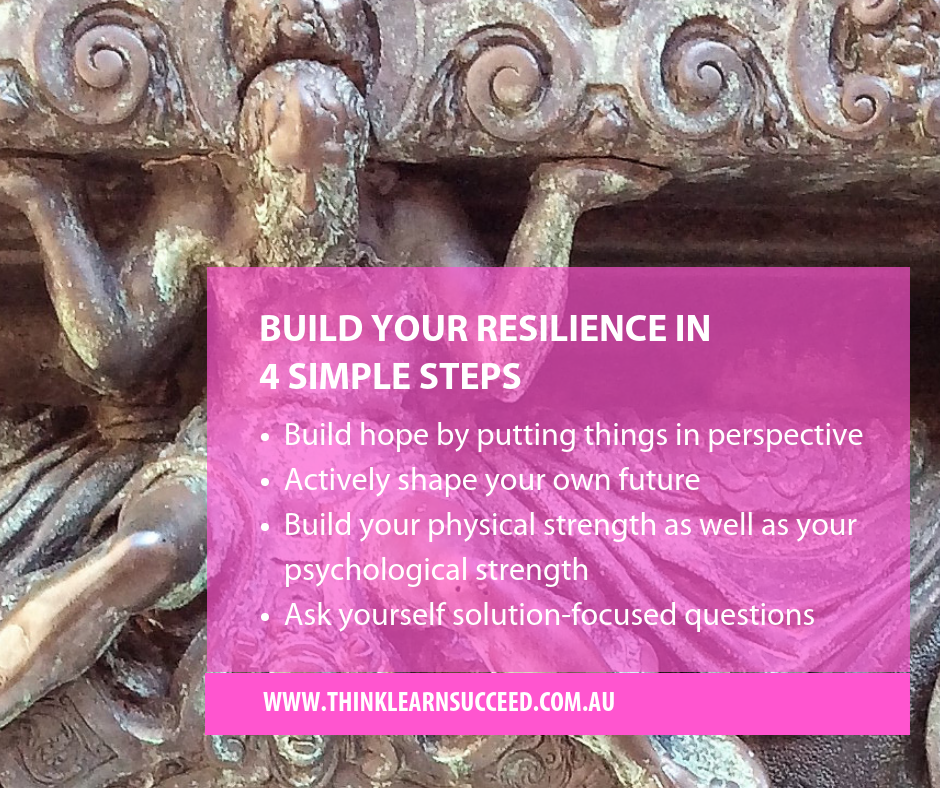 In today’s high-velocity workplace environment, you need robust tools for managing stress. That’s what researchers from positive psychology bring you. In a previous article Stay positive in tough times, I explained four ways to stay resilient when experiencing setbacks.
In today’s high-velocity workplace environment, you need robust tools for managing stress. That’s what researchers from positive psychology bring you. In a previous article Stay positive in tough times, I explained four ways to stay resilient when experiencing setbacks.
- Always have hope
- Connect to your sense of higher purpose
- Look after yourself
- Operate from a belief that solutions can be found
Here’s an example of how resilient thinking can help you thrive during change at work. Imagine an organisational restructure has just been announced. People are starting to gossip and word is out that your department is going to be shut down. Instead of joining in, here’s how you could handle the situation with resilience and optimism.
Build hope by putting things in perspective
Martin Seligman is an expert in the area of learned optimism. He points out that pessimistic thinkers frame negative experiences as both permanent (in other words, ongoing) and pervasive (impacting all areas of your life). Optimists, on the other hand, see challenging events such as redundancy, as short-term and limited to impacting on one or two aspects of your life. Use rational thinking tools to create a hopeful vision of the future and an action plan for how you will turn that vision into reality. If you find this difficult, find a coach or mentor to support you. Contact Eleanor Shakiba if you would like details on how coaching works.
Actively shape your own future
Being in limbo is an unsettling experience. Waiting passively for something to happen, or decisions to be made, erodes your confidence and saps your energy. People thrive on taking action and working towards meaningful goals. So don’t sit still – take matters into your own hands by defining your goals for the next stage of your career.
Build your physical strength as well as your psychological strength
It’s easy to slip into bad self-care habits during times of change. For example, if members of your team have recently been made redundant, your workload might increase overnight. Working longer hours to compensate might seem like a sensible solution. However, it’s likely that longer work hours will lead to reduced exercise levels, disrupted sleep patterns and way too many takeaway meals.
Always put your physical health first in times of challenge and adversity. Remember that when the going gets tough, the tough get going… to the gym. Or to a dance class. Or to the yoga studio.
Ask yourself solution-focused questions
If you find yourself worrying or feeling powerless, use solution-focused questions to blast through negative thinking. For example, ask yourself:
- Which parts of the situation do I have the power to change?
- What benefits might this change bring me?
- What are five positive things I can do right now?
- What resources can I draw on?
Famed jazz trumpeter Miles Davis once said, “When you hit a wrong note, it’s the next note that makes it good or bad.” Keep this in mind the next time you face problems at work.
About the author of this article
Eleanor Shakiba is has dedicated her career to helping talented professionals develop their confidence, communication skills and leadership savvy. She is a positive psychology trainer and success coach. Find out how Eleanor can help you or your team here.